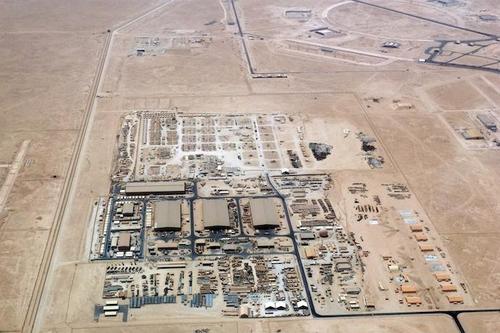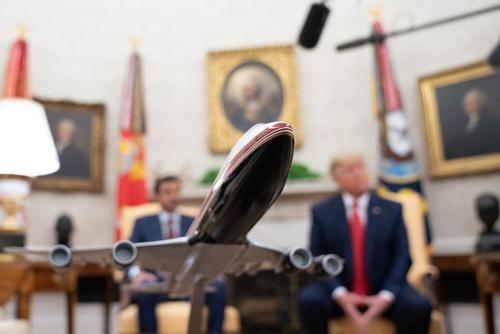Will Qatar's Investment In American Politics Pay Off In Central Asia?
Submitted by James Durso,
America’s retreat from Afghanistan was bad for U.S. taxpayers, and doubly so for Afghans abandoned in the dash to the exits.
One beneficiary was Qatar, the Persian Gulf emirate that’s hosted the Taliban’s political office since 2013, and facilitated negotiations between the U.S. and the Taliban starting in 2019.
In November, the U.S. commissioned Qatar as the “protecting power” for U.S. interests in Afghanistan. Qatar will represent U.S. interests, provide consular services, monitor the condition of the abandoned embassy in Kabul, and “facilitate the exit of Afghans with U.S. Special Immigrant Visas.”
The U.S. move was panned as “hiring an arsonist as [a] fireman,” but it demonstrated that Qatar knew “to be a player, you have to be a payer.”
Until recently, Qatar’s public profile was as the host of the 2022 FIFA World Cup, the newest venue on the Formula 1 circuit, and an aspirant to be “the art Mecca of the Middle East.” Why did the U.S. give its mandate to a government that supports the Muslim Brotherhood, hosts the leadership of the terror group Hamas and funds its operations in the Gaza Strip, and is friendly to the Iranian regime with whom it shares management of the world’s largest natural gas field?
It’s been said, “Some are born great, some achieve greatness, and some have greatness thrust upon them.” In Qatar’s case, the “thrust upon” happened in 2017 when it was embargoed by Saudi Arabia, the United Arab Emirates (UAE), Bahrain, and Egypt for alleged support for terrorism and extremism, hosting Al Jazeera, the widely watched television network, supporting the Arab Spring movements, and being chummy with Iran.
Qatar had to neutralize its opponents, so it set about making friends in the U.S., the patron of Saudi Arabia, the UAE, Bahrain, and Egypt, all well-represented in Washington. It had work to do: Saudi Arabia and the UAE spent almost four times as much in Washington as did Qatar, and U.S. President Donald Trump initially sided with the Saudis and Emiratis, who were trashing Qatar’s image in the media.

Long before Qatar was practicing checkbook diplomacy, it remembered to gift “the big guy” – the United States. In 1996, after the previous emir, Sheikh Hamad bin Khalifa Al Thani, seized power, Qatar built the Al Udeid Air Base for the U.S. After an upsurge in anti-U.S. sentiment in Saudi Arabia after the U.S. attack on Iraq, U.S. forces relocated from Saudi Arabia to Al Udeid. Qatar’s hosting and improvements to the base, the headquarters for U.S. combat commanders in the Middle East, would be a brick-and-mortar reminder of the bilateral relationship. After the U.S. evacuation of Afghanistan, Al Udeid was the first stop for many Afghan refugees headed to the United States.
According to Sasapost, Qatar’s lobbying campaign after 2017 spent almost $54 million (out of $75 million spent during the last decade), which says more about expectations in Washington than Doha. Qatar’s largesse included over $1.2 million in contributions to more than 500 political campaigns and almost $300,000 to political action committees according to the Center for International Policy.
Qatar’s campaign was made up of several elements: outreach to the White House and Capitol Hill, investment deals with U.S. states to corral their congressional delegations and highlighting the human rights violations caused by the blockade. The later issue was an opportunity for Qatar to explain how it addressed accusations of worker exploitation in construction projects for the World Cup.
In June 2018, the U.S., the UAE, and Qatar called a truce in a battle over alleged subsidies received by the Gulf airlines that violated bilateral Open Skies agreements with the U.S. The Gulf airlines countered U.S. carriers’ allegations, accusing the Americans of benefitting from post-9/11 bailouts, subsidies to aviation infrastructure, and lenient regulation. The UAE and Qatar each likely thought resolving the issue would bolster their side in the blockade dispute, so a deal was soon tabled.
The money, the local outreach, the free military base, the airline war cease-fire, and Qatar’s hosting of the Taliban political office contributed to favorably shaping Qatar’s image in Washington so, when the time came for the U.S. to deputize a representative in Kabul, Qatar was probably the only candidate.
By accepting the U.S. commission, Qatar placed itself in the middle of events in Central Asia and South Asia.
While the U.S. special representative for Afghanistan will be meeting Taliban representatives in Doha, Qatar’s envoys will be meeting Taliban leaders in Kabul. Qatar can leverage that face time to pursue its own interests in the region. Those interests won’t necessarily be antithetical to U.S. desires, but the U.S. is facilitating another state’s influence in a region it engages sporadically, which will increase its future reliance on states with entrée like, say, Qatar.
If Qatar can encourage the Taliban to facilitate trade between Central Asia and South Asia, that will boost the July transit trade agreement between Uzbekistan and Pakistan. An active trade space centered on Afghanistan will also comfort Iran that already has an established relationship with Qatar due to their shared interest in the South Pars/North Field natural gas reserve.
China, which hasn’t indicated it will return to Afghanistan, may reconsider, and recognize the Taliban government if Qatar’s efforts lower the local temperature. If China Russia, Pakistan, Iran, India, and Central Asia engage the Taliban government, the U.S. will be isolated while it busies itself looking for that “over the horizon” base to strike targets in Afghanistan.
Qatar knew how to succeed in Washington and turned its isolation into an opportunity for influence in Central Asia. Now, can it keep its footing along the Silk Road?
https://ift.tt/3sRcDCE
from ZeroHedge News https://ift.tt/3sRcDCE
via IFTTT





0 comments
Post a Comment